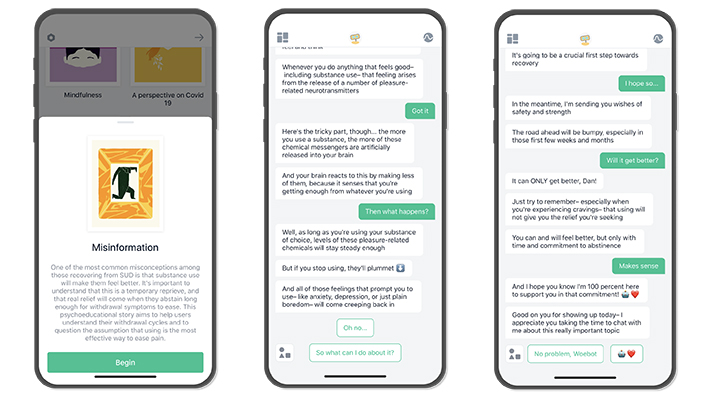
Image courtesy of Woebot Health
A recent study published in the Journal of Medical Internet Research (JMIR) shows initial support for a new version of Woebot – a text-based chatbot app designed to address mental health issues – that is designed to reduce substance use and other measures tied to substance use disorder (SUD).
Conducted by researchers from Stanford University School of Medicine and Woebot Health, the investigation found that 101 participants in the eight-week program reported reduced cravings and increased confidence in their ability to resist urges – among other encouraging outcomes.
“Following the intervention, Woebot was associated with significant reductions in problematic substance use," Dr. Judith Prochaska, a professor in Stanford University's Department of Medicine and the study's lead author, said in a statement provided by Woebot Health.
"Woebot proved feasible in delivering engaging, acceptable behavior-change tools, and with providing support to adults concerned about their use of alcohol or drugs."
On the other hand, the demographics of that participant sample are not generalizable to the broader SUD population, and only about half of those participants stuck with the study to complete a post-treatment survey.
To these points, Prochaska said that a "series of studies," including a randomized controlled study, are planned to address these shortcomings.
TOP-LINE DATA
The single-group study's participants hailed from 31 U.S. states, and more than two thirds of them reported some kind of psychiatric diagnosis. They were a mean age of 36.8 years. Some 78.2% of them were non-Hispanic white, 75.2% were female and 72.3% were employed.
Although only 5.9% reported a SUD diagnosis, participants self-identified alcohol (68.3%), cannabis (19.8%), stimulants/cocaine (6.9%) or another substance (4.9%) as their primary issue. More than a third said they had problems with multiple substances.
During the course of the eight-week program, participants used the modified chatbot app an average of 15.7 days, sent an average of 600.7 chat messages and engaged with 12.1 of the included psychoeducational or psychotherapeutic modules. The researchers noted that completion rates of the psycho-educational lessons were highest for those addressing COVID-19, urge surfing and SUD labels.
Ninety of the participants entered a total of 1,571 mood ratings into the app, while 87 entered 1,399 craving ratings and 1,403 pain ratings. Craving ratings significantly declined over the course of the study, while pain ratings did not.
Among the 51 participants who were retained and who were able to complete both pretreatement and posttreatment assessments, the researchers saw significant increases in scores related to their confidence in resisting substance use urges (P <.001).
Self-reported substance use occasions within the past month also declined (P <.001), as did a handful of other measures related to substance use, cravings and generalized anxiety. One participant reported a serious adverse event, which was deemed to be unrelated to study involvement.
About three quarters of those who completed both of the assessments said they would recommend the app to a friend, while four-fifths said the app delivered the service they were looking for. However, only 43% said they felt the chatbot met most or all of their needs.
HOW IT WAS DONE
From March 27 to May 6, 2020, researchers recruited participants through the Woebot app, social media, flyers, emails, online listings and Stanford's internal email.
To be included, participants aged 18 to 65 years needed to, own a smartphone and be English literate, among other things. They needed to screen positive on a standardized screener for problematic drug or alcohol use – but could not have a history of severe alcohol or drug-related medical problems, opioid overdoses requiring naloxone, current opioid misuse without medication-assisted treatment, or recent attempted suicide.
Participants enrolled in the study were asked to use the chatbot app for eight weeks, and were incentivized to complete the posttreatment assessment in the form of a $25 Amazon gift card.
The app itself was adapted from the standard Woebot app, which delivers cognitive behavioral therapy (CBT) through regular text-based conversations. The new version pulled from similar principles for SUD, included mood, substance use craving and pain tracking, and hosted over 50 modules focused on psycho-educational lessons and psychotherapeutic skills.
WHAT'S THE BACKGROUND?
Woebot debuted back in 2017 as an app for Facebook Messenger, where it would engage users in discussions of anxiety or depression. Data from its creators and Stanford researchers was published around that same time that outlined the chat-based tool's potential to deliver CBT for symptoms of anxiety and depression. The tool has seen much wider deployment as a standalone smartphone app in the years since.
SUD has been a major concern in the U.S. in recent years, especially in the context of COVID-19 stay-at-home orders and other stressors that are adding to the nation's burden. Rising up to the challenge are a growing number of digital entrepreneurs and early-stage startups tackling the SUD public health crisis through online counseling modules, tech-enabled clinics, non-opioid pain treatments, supportive social networks and other strategies.
IN CONCLUSION
"The scalability and accessibility of an automated program, coupled with the growing problem of substance use, suggest the potential for an engaging and effective therapeutic to reduce the burden of SUDs. Further research is needed to quantify the adoption potential and population impacts of an efficacious digital therapeutic conversational agent for SUD treatment," the researchers concluded.













